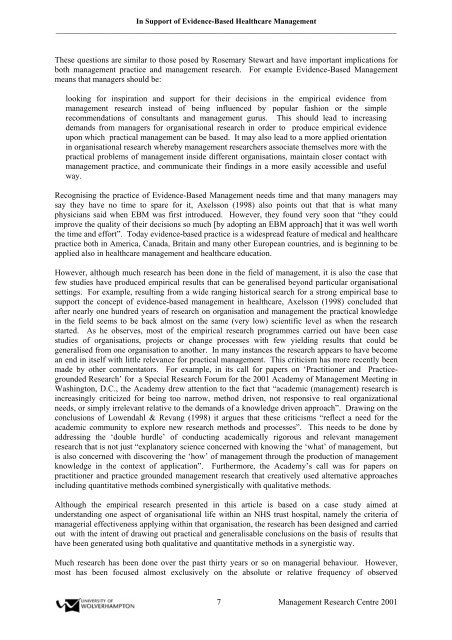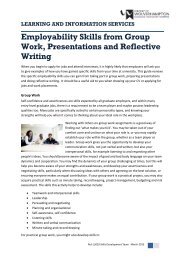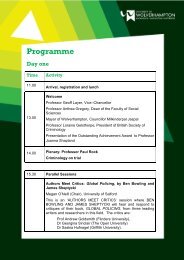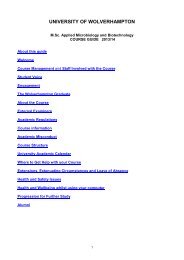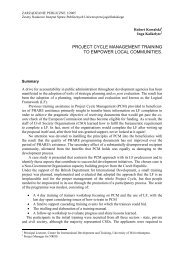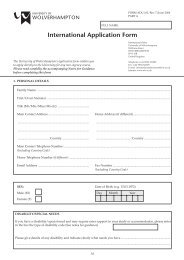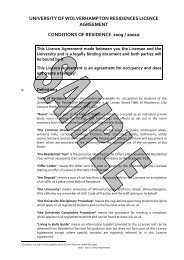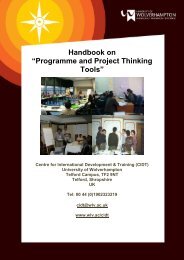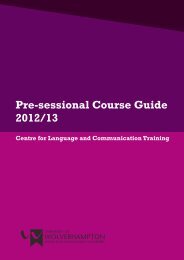In Support of Evidence-Based Healthcare Management: an ...
In Support of Evidence-Based Healthcare Management: an ...
In Support of Evidence-Based Healthcare Management: an ...
- No tags were found...
Create successful ePaper yourself
Turn your PDF publications into a flip-book with our unique Google optimized e-Paper software.
<strong>In</strong> <strong>Support</strong> <strong>of</strong> <strong>Evidence</strong>-<strong>Based</strong> <strong>Healthcare</strong> <strong>M<strong>an</strong>agement</strong>_________________________________________________________________________________________These questions are similar to those posed by Rosemary Stewart <strong>an</strong>d have import<strong>an</strong>t implications forboth m<strong>an</strong>agement practice <strong>an</strong>d m<strong>an</strong>agement research. For example <strong>Evidence</strong>-<strong>Based</strong> <strong>M<strong>an</strong>agement</strong>me<strong>an</strong>s that m<strong>an</strong>agers should be:looking for inspiration <strong>an</strong>d support for their decisions in the empirical evidence fromm<strong>an</strong>agement research instead <strong>of</strong> being influenced by popular fashion or the simplerecommendations <strong>of</strong> consult<strong>an</strong>ts <strong>an</strong>d m<strong>an</strong>agement gurus. This should lead to increasingdem<strong>an</strong>ds from m<strong>an</strong>agers for org<strong>an</strong>isational research in order to produce empirical evidenceupon which practical m<strong>an</strong>agement c<strong>an</strong> be based. It may also lead to a more applied orientationin org<strong>an</strong>isational research whereby m<strong>an</strong>agement researchers associate themselves more with thepractical problems <strong>of</strong> m<strong>an</strong>agement inside different org<strong>an</strong>isations, maintain closer contact withm<strong>an</strong>agement practice, <strong>an</strong>d communicate their findings in a more easily accessible <strong>an</strong>d usefulway.Recognising the practice <strong>of</strong> <strong>Evidence</strong>-<strong>Based</strong> <strong>M<strong>an</strong>agement</strong> needs time <strong>an</strong>d that m<strong>an</strong>y m<strong>an</strong>agers maysay they have no time to spare for it, Axelsson (1998) also points out that that is what m<strong>an</strong>yphysici<strong>an</strong>s said when EBM was first introduced. However, they found very soon that “they couldimprove the quality <strong>of</strong> their decisions so much [by adopting <strong>an</strong> EBM approach] that it was well worththe time <strong>an</strong>d effort”. Today evidence-based practice is a widespread feature <strong>of</strong> medical <strong>an</strong>d healthcarepractice both in America, C<strong>an</strong>ada, Britain <strong>an</strong>d m<strong>an</strong>y other Europe<strong>an</strong> countries, <strong>an</strong>d is beginning to beapplied also in healthcare m<strong>an</strong>agement <strong>an</strong>d healthcare education.However, although much research has been done in the field <strong>of</strong> m<strong>an</strong>agement, it is also the case thatfew studies have produced empirical results that c<strong>an</strong> be generalised beyond particular org<strong>an</strong>isationalsettings. For example, resulting from a wide r<strong>an</strong>ging historical search for a strong empirical base tosupport the concept <strong>of</strong> evidence-based m<strong>an</strong>agement in healthcare, Axelsson (1998) concluded thatafter nearly one hundred years <strong>of</strong> research on org<strong>an</strong>isation <strong>an</strong>d m<strong>an</strong>agement the practical knowledgein the field seems to be back almost on the same (very low) scientific level as when the researchstarted. As he observes, most <strong>of</strong> the empirical research programmes carried out have been casestudies <strong>of</strong> org<strong>an</strong>isations, projects or ch<strong>an</strong>ge processes with few yielding results that could begeneralised from one org<strong>an</strong>isation to <strong>an</strong>other. <strong>In</strong> m<strong>an</strong>y inst<strong>an</strong>ces the research appears to have become<strong>an</strong> end in itself with little relev<strong>an</strong>ce for practical m<strong>an</strong>agement. This criticism has more recently beenmade by other commentators. For example, in its call for papers on ‘Practitioner <strong>an</strong>d PracticegroundedResearch’ for a Special Research Forum for the 2001 Academy <strong>of</strong> <strong>M<strong>an</strong>agement</strong> Meeting inWashington, D.C., the Academy drew attention to the fact that “academic (m<strong>an</strong>agement) research isincreasingly criticized for being too narrow, method driven, not responsive to real org<strong>an</strong>izationalneeds, or simply irrelev<strong>an</strong>t relative to the dem<strong>an</strong>ds <strong>of</strong> a knowledge driven approach”. Drawing on theconclusions <strong>of</strong> Lowendahl & Rev<strong>an</strong>g (1998) it argues that these criticisms “reflect a need for theacademic community to explore new research methods <strong>an</strong>d processes”. This needs to be done byaddressing the ‘double hurdle’ <strong>of</strong> conducting academically rigorous <strong>an</strong>d relev<strong>an</strong>t m<strong>an</strong>agementresearch that is not just “expl<strong>an</strong>atory science concerned with knowing the ‘what’ <strong>of</strong> m<strong>an</strong>agement, butis also concerned with discovering the ‘how’ <strong>of</strong> m<strong>an</strong>agement through the production <strong>of</strong> m<strong>an</strong>agementknowledge in the context <strong>of</strong> application”. Furthermore, the Academy’s call was for papers onpractitioner <strong>an</strong>d practice grounded m<strong>an</strong>agement research that creatively used alternative approachesincluding qu<strong>an</strong>titative methods combined synergistically with qualitative methods.Although the empirical research presented in this article is based on a case study aimed atunderst<strong>an</strong>ding one aspect <strong>of</strong> org<strong>an</strong>isational life within <strong>an</strong> NHS trust hospital, namely the criteria <strong>of</strong>m<strong>an</strong>agerial effectiveness applying within that org<strong>an</strong>isation, the research has been designed <strong>an</strong>d carriedout with the intent <strong>of</strong> drawing out practical <strong>an</strong>d generalisable conclusions on the basis <strong>of</strong> results thathave been generated using both qualitative <strong>an</strong>d qu<strong>an</strong>titative methods in a synergistic way.Much research has been done over the past thirty years or so on m<strong>an</strong>agerial behaviour. However,most has been focused almost exclusively on the absolute or relative frequency <strong>of</strong> observed7 <strong>M<strong>an</strong>agement</strong> Research Centre 2001


